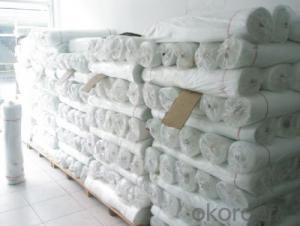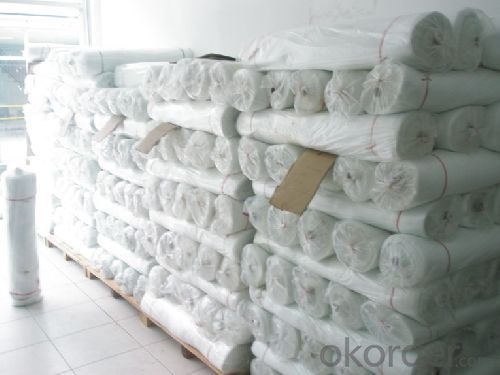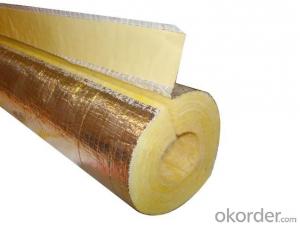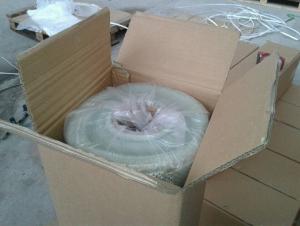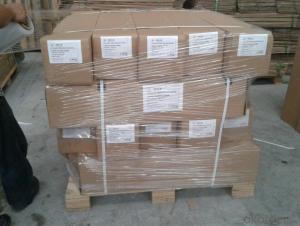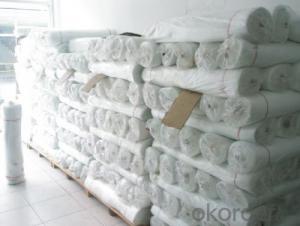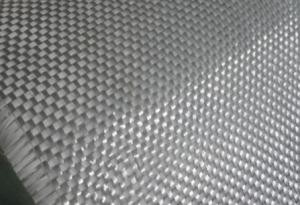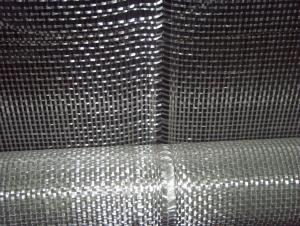Fiberglass Mat Tissue E-Glass Woven Roving Fabric
- Loading Port:
- Shanghai
- Payment Terms:
- TT or LC
- Min Order Qty:
- 16000 kg
- Supply Capability:
- 200000Kg Per Month kg/month
OKorder Service Pledge
OKorder Financial Service
You Might Also Like
1.Brief Introductions
E-Glass Woven Rovings are bidirectional fabric made by interweaving direct rovings.
E-Glass Woven Rovings are compatible with unsaturated polyester, vinyl ester, epoxy and phenolic resins.
E-Glass Woven Rovings are a high-performance reinforcement widely used in hand lay up and robot processes to manufacture boats, vessels, plane and automotive parts, furniture and sports facilities.
2.Product Features
Warp and weft rovings aligned in a parallel and flat manner, resulting in uniform tension
Densely aligned fibers, resulting in high dimensional stability and making handling easy
Good moldability, fast and complete wet out in resins, resulting in high productivity
Good mechanical properties and high strength of parts
3.Product Specifications
Property | Area Weight | Moisture Content | Size Content | Width |
(%) | (%) | (%) | (mm) | |
Test Method | IS03374 | ISO3344 | ISO1887 | |
EWR200 | ±7.5 | ≤0.15 | 0.4-0.8 | 20-3000 |
EWR270 | ||||
EWR300 | ||||
EWR360 | ||||
EWR400 | ||||
EWR500 | ||||
EWR600 | ||||
EWR800 |
Special specification can be produce according to customer requirements.
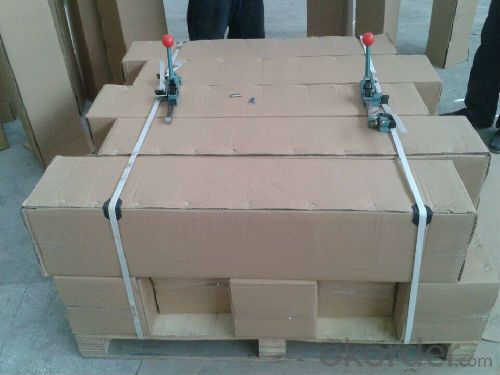
4.FAQ
Packaging:
Each woven roving is wound onto a paper tube which has an inside diameter of 76mm and the mat roll has a diameter of 220mm. The woven roving roll is wrapped up with plastic film,and then packed in a cardboard box or wrapped up with kraft paper. The rolls can be horizontally placed. For transportation, the rolls can be loaded into a cantainer directly or on pallets.
Unless otherwise specified,It should be stored in a dry, cool and rain-proof area. It is recommended that the room temperature and humidity should be always maintained at 15℃~35℃ and 35%~65% respectively.
- Q: Can fiberglass mat tissue be used for windbreak panels?
- Yes, fiberglass mat tissue can be used for windbreak panels. Fiberglass mat tissue is a lightweight and flexible material that is commonly used in various applications such as insulation, reinforcing materials, and structural support. It is known for its high strength-to-weight ratio, durability, and resistance to weather and environmental conditions. When used in windbreak panels, fiberglass mat tissue can provide additional reinforcement and stability to the panels. It can help withstand strong winds and prevent damage or breakage, making it an effective choice for windbreak panels. Moreover, fiberglass mat tissue is also known for its excellent thermal and acoustic insulation properties. This can be beneficial in windbreak panels as it can help to reduce noise and regulate temperature, creating a more comfortable and protected environment. Additionally, fiberglass mat tissue is fire-resistant, making it a safe option for windbreak panels. Overall, fiberglass mat tissue can be a suitable and reliable material for windbreak panels due to its strength, durability, insulation properties, and resistance to environmental conditions.
- Q: What is the cost of fiberglass mat tissue?
- The cost of fiberglass mat tissue can vary depending on factors such as the thickness, size, and brand. It is best to check with suppliers or retailers for specific pricing information.
- Q: Can fiberglass mat tissue be used for pipe wrapping?
- Pipe wrapping can indeed utilize fiberglass mat tissue, a lightweight and flexible material extensively employed in reinforcing and safeguarding various structures, including pipes. The primary purpose of fiberglass mat tissue is to enhance the pipes' strength and durability, thereby rendering them more resilient to damage and corrosion. Wrapping the pipe with fiberglass mat tissue is a simple process that creates a protective layer, effectively preventing leaks and prolonging the pipe's lifespan. Moreover, fiberglass mat tissue is renowned for its remarkable insulation properties, contributing to the maintenance of the contents' temperature as they flow through the pipe. Consequently, fiberglass mat tissue serves as a suitable material for pipe wrapping and finds widespread application across diverse industries.
- Q: Can fiberglass mat tissue be used for ceiling insulation?
- No, fiberglass mat tissue is not suitable for ceiling insulation. While fiberglass mat tissue is commonly used in various construction applications, such as reinforcing plaster or other building materials, it is not designed or recommended for insulation purposes. When it comes to ceiling insulation, there are specific materials that are more suitable and effective, such as fiberglass batts, cellulose, or foam insulation. These materials are specifically engineered to provide thermal resistance and reduce the transfer of heat between the interior and exterior of a building. Using fiberglass mat tissue as ceiling insulation would not only be ineffective in providing proper insulation, but it may also pose safety risks. Fiberglass mat tissue is typically thin and lacks the necessary thickness to effectively insulate ceilings. Additionally, fiberglass insulation materials are known to release airborne particles and fibers, which can be hazardous to health if inhaled. Therefore, it is important to use the appropriate insulation materials that are specifically designed for ceiling insulation to ensure energy efficiency, comfort, and safety in your home or building.
- Q: Can fiberglass mat tissue be used for making lightweight ceilings?
- Yes, fiberglass mat tissue can be used for making lightweight ceilings. Fiberglass mat tissue is a thin and lightweight material made from fiberglass strands that are bonded together with a binder. It is commonly used in construction and building applications due to its excellent strength-to-weight ratio. When used for making lightweight ceilings, fiberglass mat tissue can provide several advantages. Firstly, it is lightweight, which makes it easier to handle and install. This can save time and effort during construction or renovation projects. Additionally, fiberglass mat tissue is also known for its high tensile strength and durability, making it a suitable choice for ceilings that need to withstand various loads and stresses. Furthermore, fiberglass mat tissue has good thermal insulation properties, which can help in maintaining a comfortable indoor environment. It can also offer sound insulation benefits, reducing noise transmission between different spaces or floors. Moreover, fiberglass mat tissue is resistant to moisture, mold, and mildew, which makes it suitable for areas with high humidity or moisture concerns such as bathrooms or kitchens. It is also non-combustible, providing an added level of fire resistance to the ceiling structure. In conclusion, fiberglass mat tissue can indeed be used for making lightweight ceilings. Its lightweight nature, strength, durability, thermal and sound insulation properties, as well as resistance to moisture and fire, make it a suitable choice for various ceiling applications.
- Q: Is fiberglass mat tissue suitable for insulation in sports facilities?
- Yes, fiberglass mat tissue is suitable for insulation in sports facilities. It is a commonly used material for insulation due to its excellent thermal insulation properties, durability, and resistance to moisture. Additionally, fiberglass mat tissue is lightweight and easy to install, making it a practical choice for sports facilities where energy efficiency and temperature control are important factors.
- Q: Can fiberglass mat tissue be used for flooring applications?
- No, fiberglass mat tissue is not typically used for flooring applications. It is commonly used in industries such as automotive, construction, and marine for insulation, reinforcement, and insulation purposes. Flooring applications usually require different materials such as tiles, hardwood, laminate, or vinyl.
- Q: Can fiberglass mat tissue be used for automotive repairs?
- Automotive repairs can indeed utilize fiberglass mat tissue. This versatile material finds its application across various industries, including the automotive sector. It serves to reinforce and mend auto body panels, while also addressing cracks, holes, and other damages that may afflict the vehicle's body. Comprised of resilient fibers held together by a resin, fiberglass mat tissue boasts exceptional strength and flexibility. As a result, it proves to be an ideal choice for automotive repairs. Its malleability allows it to conform to different contours and shapes of car parts, ensuring a seamless and precise restoration. Moreover, fiberglass mat tissue possesses the desirable qualities of being lightweight and durable, both of which are vital attributes for automotive repairs. It offers unparalleled resistance against corrosion, weathering, and other external elements, thereby guaranteeing the longevity of the repair. Additionally, it provides reliable impact resistance, effectively safeguarding the repaired area from further harm. Furthermore, fiberglass mat tissue harmonizes effortlessly with a wide range of automotive coatings, including primers, paints, and clear coats. This compatibility ensures a flawlessly smooth and professional finish once the repair work is completed. To summarize, fiberglass mat tissue stands as an appropriate choice for automotive repairs due to its formidable strength, flexibility, durability, and compatibility with automotive coatings. It is commonly employed in the industry to reinforce and mend auto body panels, address damages, and achieve an impeccable finish.
- Q: Is fiberglass mat tissue suitable for insulation in food processing facilities?
- No, fiberglass mat tissue is not suitable for insulation in food processing facilities.
- Q: What is the delamination strength of fiberglass mat tissue?
- The delamination strength of fiberglass mat tissue refers to its ability to resist separation or peeling of layers within the material. It is a measure of the adhesive strength between the fibers and the binder in the mat. The specific delamination strength of fiberglass mat tissue can vary depending on factors such as the manufacturing process, binder type, and overall composition of the material.
Send your message to us
Fiberglass Mat Tissue E-Glass Woven Roving Fabric
- Loading Port:
- Shanghai
- Payment Terms:
- TT or LC
- Min Order Qty:
- 16000 kg
- Supply Capability:
- 200000Kg Per Month kg/month
OKorder Service Pledge
OKorder Financial Service
Similar products
Hot products
Hot Searches
Related keywords
